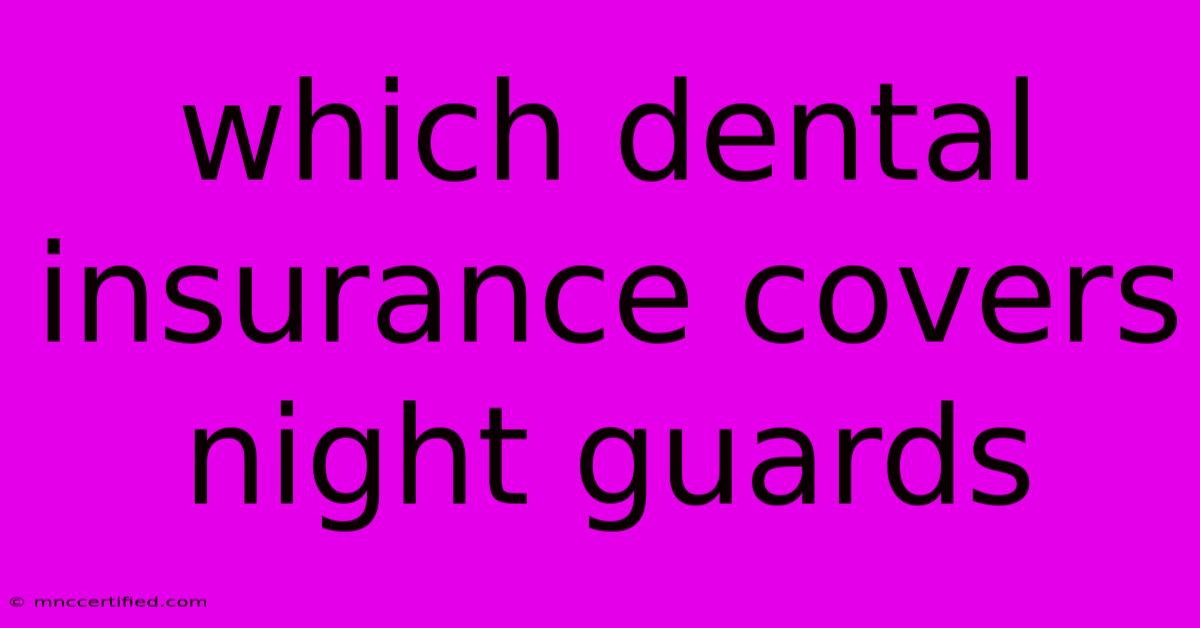Which Dental Insurance Covers Night Guards

Table of Contents
Which Dental Insurance Covers Night Guards?
Grinding your teeth at night, also known as bruxism, can lead to serious dental problems like chipped teeth, jaw pain, and headaches. A night guard can protect your teeth and prevent these issues, but you might be wondering: Does my dental insurance cover it?
The answer isn't always straightforward. Here's a breakdown of what you need to know:
Does My Dental Insurance Cover Night Guards?
The coverage for night guards varies greatly depending on your specific dental plan. Here's a general guide:
- PPO (Preferred Provider Organization): These plans often offer better coverage for night guards than HMOs. They usually provide coverage for medically necessary procedures, and bruxism can be considered medically necessary if it's causing significant pain and damage.
- HMO (Health Maintenance Organization): HMOs generally have more restrictive coverage. They might require pre-authorization for night guards and may only cover them if they are deemed medically necessary by your dentist.
- Dental Savings Plans: These plans typically don't cover night guards. They offer discounts on dental services but don't provide actual insurance coverage.
Factors Affecting Coverage
Here are some factors that influence whether your plan covers night guards:
- Your plan's specific benefits: The specifics of your policy matter. Some plans might cover a certain percentage of the cost, while others have a set dollar limit.
- Your dentist's diagnosis: Your dentist must diagnose you with bruxism, and they may need to provide documentation supporting the medical necessity of a night guard.
- The type of night guard: Some plans might only cover certain types of night guards, like those made of soft materials.
How To Find Out If Your Insurance Covers Night Guards
The best way to determine if your plan covers night guards is to contact your insurance provider directly:
- Review your policy: Look for information about coverage for "night guards," "bruxism," or "dental appliances."
- Call your insurance provider: Ask them about your specific coverage for night guards and what documentation is needed.
- Talk to your dentist: They can help you understand your plan's coverage and advise you on the best course of action.
What To Do If Your Insurance Doesn't Cover Night Guards
If your insurance doesn't cover night guards, don't despair! There are still options:
- Negotiate with your dentist: They might be willing to offer a discount for cash-paying patients.
- Shop around for other insurance plans: You might find a plan that offers better coverage for night guards.
- Consider a dental savings plan: Even though they don't cover night guards directly, they can offer discounts on the cost.
- Explore financing options: There are several financing options available, including dental loans and payment plans.
Conclusion
Knowing your dental insurance coverage for night guards is essential. By reviewing your policy, contacting your insurance provider, and talking to your dentist, you can make informed decisions about your dental care. Remember, protecting your teeth from the damaging effects of bruxism is crucial, even if your insurance doesn't fully cover the cost.

Thank you for visiting our website wich cover about Which Dental Insurance Covers Night Guards. We hope the information provided has been useful to you. Feel free to contact us if you have any questions or need further assistance. See you next time and dont miss to bookmark.
Featured Posts
-
Bauserman V Unemployment Insurance Agency
Nov 07, 2024
-
Does Distracted Driving Increase Insurance
Nov 07, 2024
-
Donald Trumps Inauguration Timeline
Nov 07, 2024
-
Does Homeowners Insurance Cover Ice Damage
Nov 07, 2024
-
Club Brugge Wins 1 0 Over Aston Villa
Nov 07, 2024